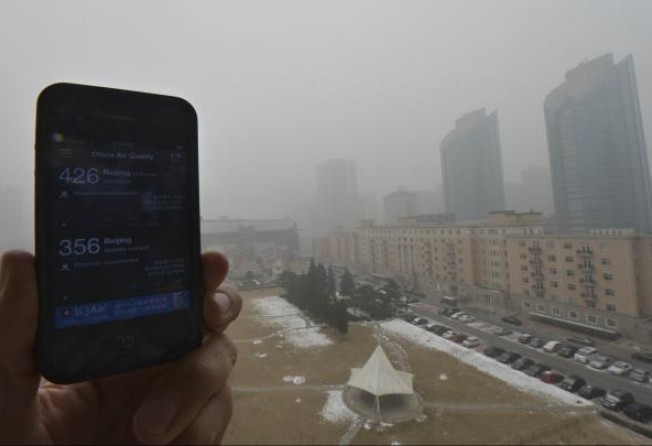
Smog crisis sounds alarm bells for China

When a leading doctor in Beijing criticised the term “Beijing Cough” – a nickname foreigners give to the chronic respiratory problems they believe are caused by polluted air – he received more criticism than praise from Chinese netizens.
This is unusual as Chinese people generally believe in the saying: “Do not wash your dirty linen in public”. When confronting outside critics, their first reaction is usually to rebuff them. However, with smog plaguing northern China for over a week, people’s anger about air pollution has reached an all-time high.
Criticism of the government’s inability to tackle pollution had been overwhelming in every form of media. People kept their children indoors and wore masks when going out. If the poor air quality continues, nobody will be surprised if public protests occur.
In fact, complaints about air pollution are nothing new in Beijing. For years, the city has been notorious for its sand storms in spring, mainly caused by deforestation and over-grazing in northern areas like Inner Mongolia. While preparing for the 2008 Olympic Games, Beijing’s city government was also frequently criticised for its air pollution. Some athletes complained the dirty air made it hard to breathe.
To address international concerns, the city administration closed or moved most polluting plants, including those of giant steel corporation Shougang Group. It also joined the central government in allocating funds for grassland and forest reservation in northern areas.
The campaign against sand storms worked well. In recent years, these have been fallen significantly in frequency and severity. Other efforts after the Olympic Games made little progress as the international community shifted its attention away from Beijing.

Meanwhile, the rapidly-growing number of cars in the city has made emissions a major cause of air pollution. Beijing now has 5 million cars – 2.5 times that of 10 years ago. In winter, coal-burning for heating has added to the problem. Official explanations cite these two factors as the cause of the severe smog last week.
The public had little knowledge of the real harm to their health from pollution until the American embassy released its PM2.5 monitoring results, which was widely posted by celebrity bloggers on Weibo. This forced the Environmental Protection Bureau to release its own PM2.5 pollution statistics. Last week, the PM2.5 reading reached around 1000, a level regarded as “highly hazardous” to all the population.
Apparently, after decades of rising household incomes, the public is more concerned about environmental issues than ever. Reports on rapidly rising lung and other cancers in major cities have added to their worries.
Many wealthy people have left China, seeking better living conditions for their children. Media surveys say over half of the mainland’s billionaires have foreign passports; a large number of middle-income families are also planning to emigrate. Those unable to leave for financial reasons still try to do so.
In recent years, high-profile protests against industrial projects erupted in affluent coastal cities including Xiamen and Dalian. In China, where any form of political dissent is restricted and punished, some people are ready to risk it for the sake of their health and that of their families.
Facing growing discontent and criticism, the Beijing city government published draft regulations over the weekend. This authorises the government to restrict use of cars, halt production at polluting factories and adopt other emergency measures on heavily polluted days.
This response shows the new Chinese leadership’s readiness to tackle what is now a crisis. This is also in line with the city’s development plan of becoming a service-oriented political and cultural hub. Given the nature of China’s economy, dominated by state-owned companies, Beijing’s role as an economic hub will continue in future. Revenue from tourism, conferences and cultural performances are important economically.
Unlike other badly-needed reforms in China, which often meet strong opposition from powerful interest groups, improving air quality has the support of everyone; after all, officials and billionaires need to breathe, too.
It’s certain Beijing’s air quality will improve after the government substitutes more natural gas for coal, limits traffic and shuts down polluting factories. Hopefully, these polices will be adopted by other developing countries.
However, China is still in the process of industrialisation. It has purchased hundreds of mines around the globe to ensure supplies of fuel and raw materials. China’s economy still relies heavily on industrial production, much of which is still highly polluting. Where would they produce these industrial products if polluting facilities become unwelcome in eastern cities?
Thus, what bodes well for major cities in eastern and coastal regions may prove disastrous for those living in inland regions when the government moves more heavy industrial plants westward to less-populated regions. Governments there are welcoming these projects to help boost economic growth. The lower-income population might also be willing to make some sacrifices in exchange for jobs and higher incomes, at least in the short-term. But if the central government can’t learn from the smog crisis, namely achieving a balance between economic development and environmental protection, it will re-occur in future. There simply isn’t enough “western” or “inland” regions to move all the pollution to.
Zhang Hong is the deputy editor in chief of the Economic Observer, an influential business newspaper based in Beijing.